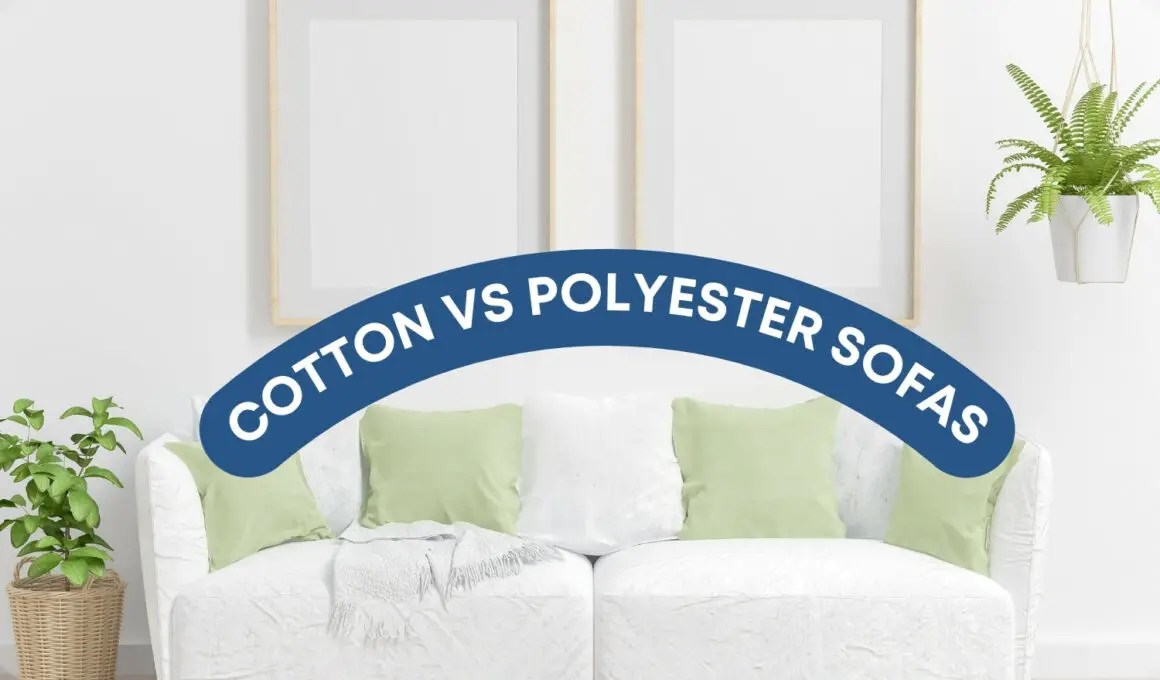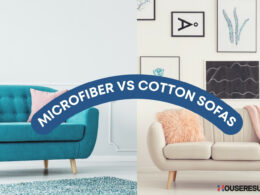Table of Contents Show
Deciding on the perfect sofa is no small task. As both a seasoned homeowner and a contractor, I’ve seen the excitement in my client’s eyes when they picture relaxing on their brand-new sofa, anchoring their living space with style and comfort.
But often, this enthusiasm meets confusion when they’re faced with the choice: polyester or cotton? It’s a question that deserves careful consideration because, let’s face it, a sofa is both a financial investment and a central piece of your home’s everyday life.
Why does this fabric choice matter so much? Well, the material of your sofa determines not just how it feels but also how it wears over the years, how simple it is to clean, and, of course, how it complements your living space’s aesthetic.
Each type has its advocates and its fair share of drawbacks, but what works for one household may not work for another. Understanding the nuances between polyester and cotton sofas is key to making a choice you’ll be satisfied with for years to come.
This post walks through the essential knowledge and comparative insights on polyester and cotton sofas. We’re covering everything from the nitty-gritty of everyday maintenance to the broad strokes of environmental impact and comfort.
So, whether you’re refurbishing, starting fresh, or just curious, stick around to equip yourself with the information you need to navigate this decision confidently.
Quick Answer
The main difference between polyester and cotton sofas is their material composition, which directly influences durability, comfort, and maintenance. Polyester sofas are synonymous with strength, easy care, and colorfastness, making them ideal for high-traffic living spaces and budget-conscious shoppers. In contrast, cotton sofas appeal with their breathable fabric, soft touch, and natural hypoallergenic properties, perfect for those seeking comfort and an eco-friendly footprint. Consider factors like household activity, local climate, and sustainability preferences when choosing. For a balance of both worlds, polyester-cotton blends offer a harmonious compromise, merging resilience with coziness.
Polyester Sofas: Pros and Cons
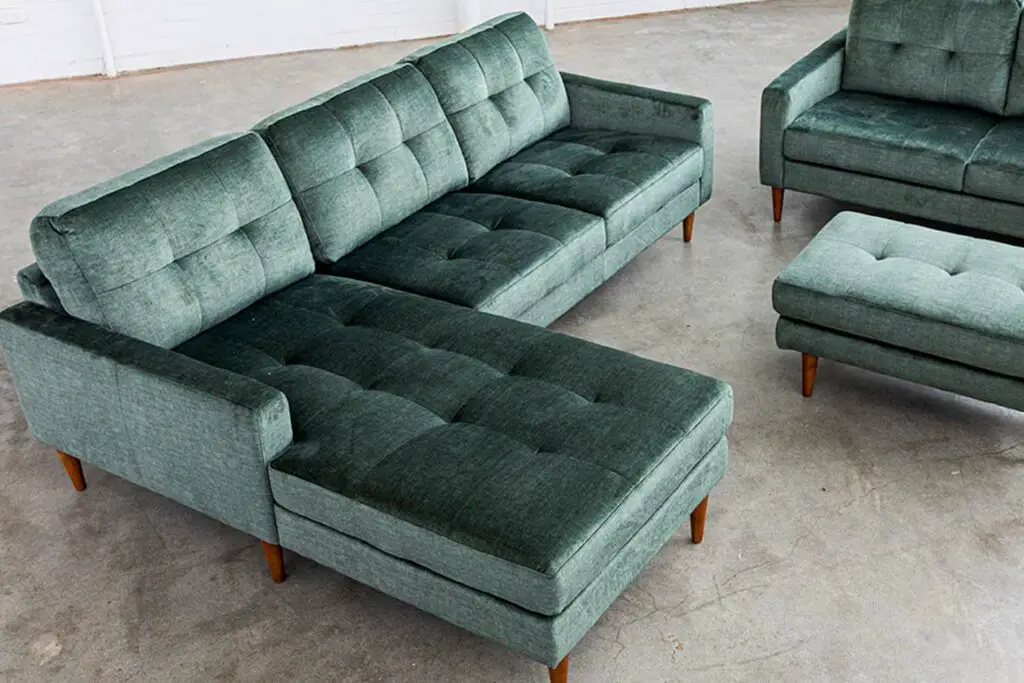
When it comes to furnishing your living space, selecting the right fabric for your sofa is key to your comfort and the room’s overall ambiance. Polyester, a highly popular and widely used material, often emerges as a top contender. Here, we’ll explore the various pros and cons of choosing a polyester sofa for your home.
Advantages of Polyester Sofas
Durability that Withstands the Test of Time
Polyester is renowned for its impressive strength, making it a durable option for sofas expected to endure extensive daily use. Households with children or pets often lean towards polyester upholstery for its resistance to wear and tear.
Ease of Maintenance for a Stress-Free Home
For those seeking a low-maintenance lifestyle, polyester sofas are a blessing. They resist water-based stains, making cleaning a relatively simple task. This aspect is particularly appealing for busy households or those who prefer hassle-free upkeep.
Color Retention for Lasting Brightness
One notable benefit of a polyester sofa is its ability to hold color exceptionally well, keeping its appearance vibrant and fresh over time. It stands up to sun exposure without fading, ensuring that the aesthetic appeal of your living space remains consistent.
Cost-Effectiveness for Budget-Friendly Decisions
In comparison to other materials, polyester offers affordability without compromising on style or comfort. This cost-effectiveness makes it an attractive choice for anyone furnishing their spaces on a budget but unwilling to sacrifice quality and appearance.
Disadvantages of Polyester Sofas
Environmental Impact Challenges
As a synthetic fabric, polyester’s manufacturing process and non-biodegradability present significant environmental concerns. Its production involves chemicals and non-renewable resources, and the material doesn’t break down easily, contributing to longer-lasting waste.
Breathability Limitations for Comfort Seekers
Compared to its natural counterparts, polyester lacks breathability. This limitation can lead to a less comfortable sitting experience, especially in warmer climates or seasons, potentially making the sofa feel stuffy or hot.
Potential for Pilling Disrupts Smoothness
Despite its notable durability, polyester fabric is prone to pilling, primarily when blended with other fibers. This pilling can disrupt the material’s smooth feel over time, leading to a less-than-ideal tactile experience and a worn-out appearance.
Choosing a sofa involves balancing practicality with personal preference, and understanding these aspects ensures you are well-prepared to make an informed decision.
Whether the benefits of a polyester sofa for daily use outweigh its downsides will depend on individual lifestyle needs, environmental values, and comfort priorities. As you weigh these factors, you’ll find yourself one step closer to selecting the perfect centerpiece for your living room.
Cotton Sofas: Pros and Cons
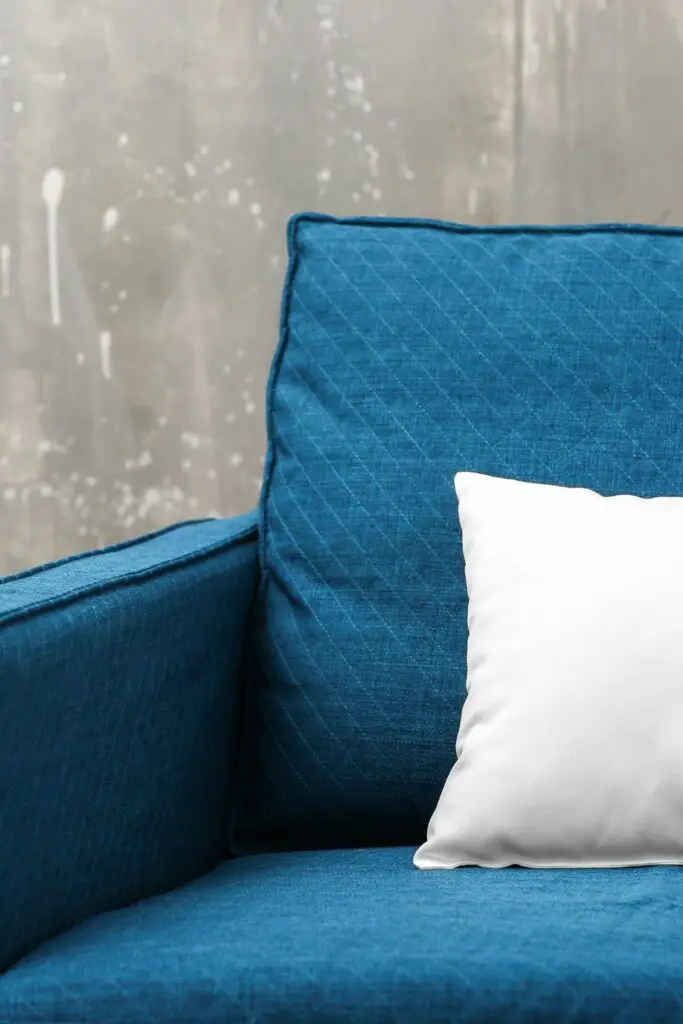
In the realm of sofa selections, cotton stands out as a time-honored favorite among homeowners who treasure comfort and natural quality. But like any material, cotton isn’t without its drawbacks. Below, we dissect the advantages and disadvantages of opting for a cotton sofa in your living space, providing clarity for those torn between cotton and synthetic alternatives.
Advantages of Cotton Sofas
Supreme Comfort for Relaxing in Style
Nothing matches the soft, cozy embrace of a cotton sofa, offering a comfort level that synthetic materials find hard to rival. Its natural fibers provide a plush surface that invites relaxation, making your sofa a haven for downtime or leisurely conversations.
Breathability Brings a Fresh Experience
Cotton is celebrated for its breathability, a feature particularly noticeable in warm weather or heated indoor environments. This air circulation offers a fresh, airy sitting experience, preventing the discomfort of sticking to the sofa – a common issue with certain materials in hot conditions.
Natural Composition for Eco-Conscious Living
For those mindful of their environmental footprint, cotton sofas hit the mark. Made from natural fibers, cotton is biodegradable, reducing its ecological impact. Its sustainable nature appeals to environmentally conscious individuals keen on responsible purchasing decisions.
Disadvantages of Cotton Sofas
Intensive Maintenance Requirements
A common query among prospective buyers is, “Does a cotton sofa stain easily?” Unfortunately, the answer leans toward yes. Cotton sofas require more effort in maintenance, with susceptibility to water-based stains, demanding prompt cleaning actions and regular upkeep to maintain their pristine condition.
Shrinking and Wrinkling Concerns
Cotton, though delightful in texture, is known for its tendency to shrink and wrinkle. This characteristic can be particularly problematic with removable covers that require washing, as they may not fit as seamlessly afterward, compromising the sofa’s aesthetic appeal.
When subjected to consistent sunlight, cotton’s colors may lose their vibrancy faster than their synthetic counterparts. Additionally, despite its comfort, cotton tends to wear out more quickly, potentially leading to thinning or tearing, especially in households with high sofa traffic or pets.
Understanding the full picture of owning a cotton sofa ensures no surprises down the road. While they demand a bit more care and attention, their comfort and eco-friendly nature present compelling benefits.
Ultimately, choosing between cotton and alternatives like polyester will hinge on your lifestyle preferences, environmental considerations, and readiness to commit to maintenance routines. Making an informed choice means years of satisfaction with your living space’s centerpiece.
Considerations Before Making Your Purchase
Selecting the right sofa extends beyond a simple choice between polyester and cotton. It’s a decision that’s also deeply influenced by your individual circumstances, lifestyle, and preferences. As such, before you make a purchase, it’s crucial to reflect on several key factors to ensure your new sofa doesn’t just fit your living room, but also your life.
1. Allergies – A Health Priority
If you or your family members are prone to allergies, your sofa’s material becomes a health consideration. Cotton, being hypoallergenic, tends to be friendlier to sensitive skin and less likely to trigger reactions. It doesn’t hold onto pet dander or pollen as much as synthetic fibers, providing a safer environment for allergy sufferers.
2. Pets – Compatibility with Furry Friends
Your beloved pets can significantly influence your fabric choice. Polyester often fares better with pets as it’s more resistant to scratches, less likely to snag on claws, and generally easier to clean. It’s also less prone to absorbing odors—a common issue for pet owners.
3. Children – Balancing Comfort and Practicality
Households with children know that spills, stains, and wear are part of daily life. Polyester’s stain-resisting and durable nature can be more forgiving with kids around, whereas cotton might require more stringent rules in the living room due to its higher maintenance needs.
4. Local Climate – Adapting to Your Environment
Your geographical location and the local climate should influence your decision. Residents in hotter climates might prefer cotton for its breathability and cool comfort, while those in cooler areas may not face any discomfort with polyester.
5. Personal Style Preference – Expressing Yourself
Your sofa should also be a reflection of your style. Whether you lean towards the natural, classic aesthetic that cotton offers, or the modern, sleek versatility of polyester, choose a material that complements your décor and personal taste.
6. Sustainability Concerns – Eco-friendly Choices
If environmental impact is a concern for you, this could be a deciding factor. Cotton, especially organic varieties, tends to have a lesser environmental impact compared to the chemical processes involved in producing synthetic polyester.
7. Budget Constraints – Quality within Means
Financial considerations can’t be overlooked. While both materials range in price depending on quality, brand, and other factors, polyester sofas generally edge out as the more cost-effective option, whereas cotton can be slightly pricier, especially for organic or high-thread-count varieties.
Purchasing a sofa is an investment in your home and well-being. It’s essential to blend personal needs with practical considerations, ensuring your living space is both comfortable and functional. Consider all these aspects in relation to your current circumstances before finalizing your decision, as the right choice will provide satisfaction and comfort for years to come.
Polyester-Cotton Blend: Is it the Best of Both Worlds?
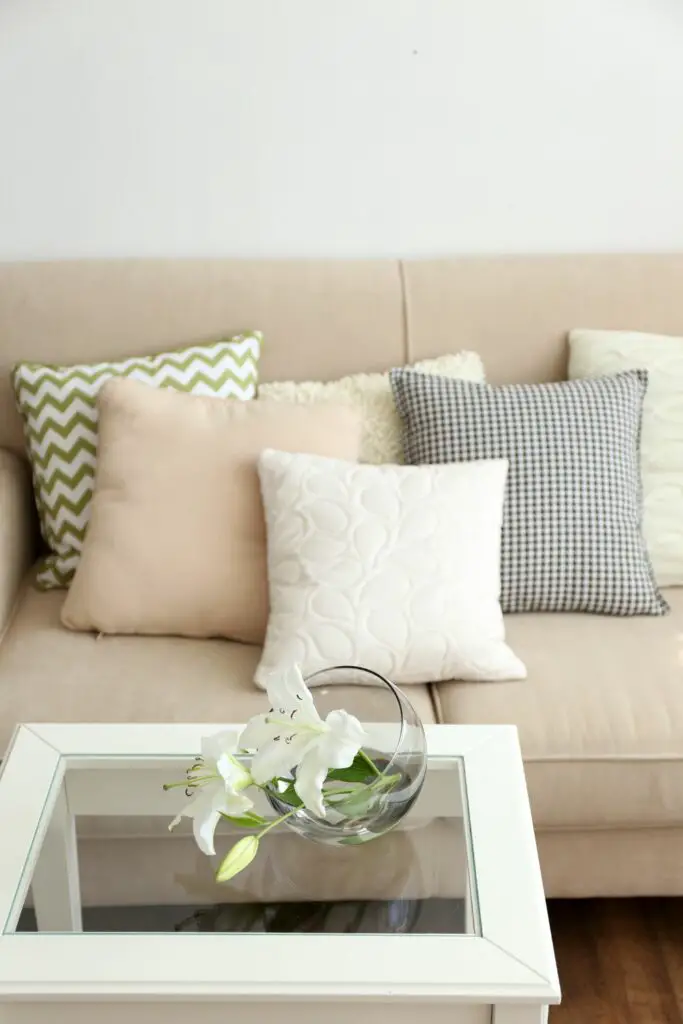
Navigating the decision between polyester and cotton sofas can be complex, with each material offering distinct advantages and disadvantages. However, there’s a third option that often flies under the radar: the polyester-cotton blend. This hybrid approach brings together the best qualities of both materials, potentially offering a balanced solution for the discerning homeowner.
According to a study published in the Scimago Journal & Country Rank blending fibers like polyester and cotton can enhance the overall properties of the fabric, providing improved dimensional stability, and wrinkle recovery, and potentially extending the fabric’s service life.
Essentially, by merging natural and synthetic fibers, manufacturers create a product that aims to maximize strengths and minimize weaknesses.
When considering a polyester-cotton blend for your sofa, understanding how these fabrics balance out, depending on their ratio, is crucial.
1. Balanced Durability with Comfort
A significant advantage of a blended fabric is its ability to resist wear and tear better than pure cotton, thanks to polyester’s strength. Simultaneously, the cotton component ensures that the fabric remains soft to the touch and breathable, offering a comfortable sitting experience.
2. Enhanced Aesthetic Appeal
Blended fabrics tend to wrinkle less than pure cotton, maintaining a crisp, sleek look over time. They also offer improved colorfastness, ensuring the sofa’s color stays vibrant, enhancing the overall aesthetic appeal of your living space.
3. Ease of Maintenance
One common question is, “Are polyester-cotton blend sofas easy to clean?” The answer leans toward yes. These blends tend to resist stains better than pure cotton, simplifying the cleaning process. They’re less likely to shrink or wrinkle after washing, making them low-maintenance compared to their pure cotton counterparts.
4. Cost-Effectiveness
Blended fabric sofas can also be more cost-effective than pure cotton options. By combining synthetic and natural materials, manufacturers can keep costs down, passing these savings on to the customer without significantly compromising on quality or comfort.
However, it’s important to note that the specific ratio of polyester to cotton can alter these benefits. A higher polyester content may enhance durability and reduce costs, but it could also lead to a decrease in breathability and comfort.
Conversely, a higher cotton ratio means a softer, more breathable fabric, but one that may require more care and be prone to wrinkling.
For potential buyers exploring less-known territories like blended fabric sofas, these insights are crucial. A polyester-cotton blend can indeed be the best of both worlds, offering a middle ground in the sofa material debate.
As always, consider your unique needs and preferences when deciding, and you might find this balanced option is exactly what you’ve been looking for.






